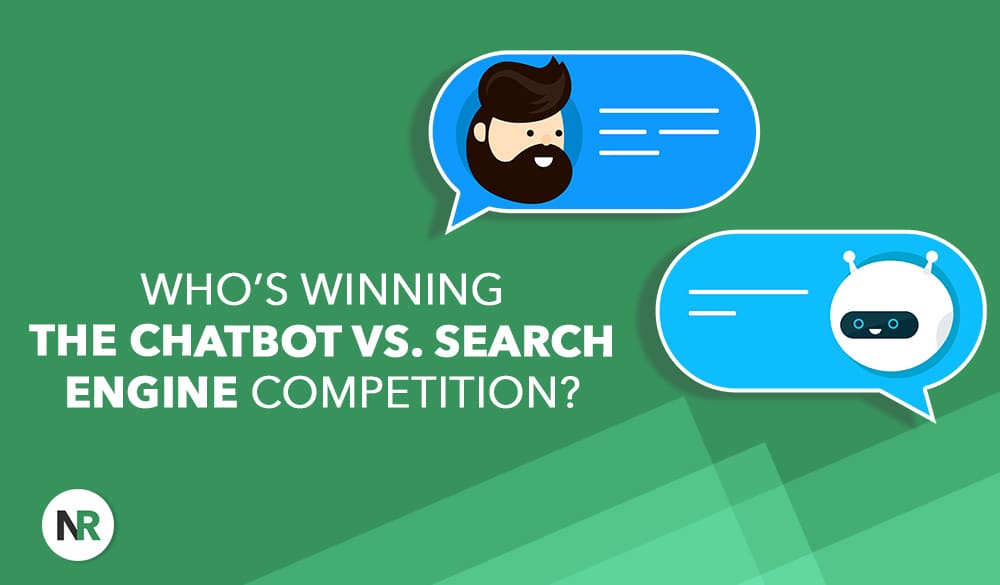This article discusses the chatbot / search engine debate that daily users and industry professionals are having.
In 2025, a question you may have Googled a year or two ago is now being plugged into your favorite AI chatbot. Everything from air fryer recipes to current real estate prices to health FAQs can be queried and answered via ChatGPT and similar tools, making them bona fide search engine alternatives. This is especially true for users who prefer an immediate answer and a conversational experience over pages of blue links to scroll through.
But are AI chatbots actually taking the place of traditional search, or are they developing in harmony with them?
How (and if) these two technologies are managing to coexist is what OneLittleWeb set out to discover through its two-year data study on global web traffic trends. For the study, the top 10 search engines and top 10 AI chatbots were compared to assess growth and user behavior. In this article, we’ll discuss the differences between AI chatbots and search engines, as well as what OneLittleWeb found.
NetReputation provides information and services to help you stand out online in both AI searches and traditional search. Call us at 844-461-3632 to learn more, or fill out the contact form below for a free consultation.
Request a Free Consultation
What Are the Main Differences Between Traditional and AI Searches?
Before we dive into whether one type of search tool is more commanding than the other, let’s briefly go over the core differences between Google Search and AI searches.
How AI Chatbots Work
- Chatbots reply to users in direct, conversational, and personalized ways using natural language. Responses are based on the data the chatbot has trained on, as well as the context it gathers from the user.
- Chatbots can be excellent for personalized planning, such as creating a workout regimen or a travel itinerary.
- Chatbots have a long-term memory and can continually personalize responses based on relevant information retrieval from past chats.
- AI chatbots offer ad-free responses. For users who are sick of dealing with ad-supported search engines and online articles, no-ad chats are much preferred.
How Search Engines Work
- Search engines crawl and index billions of pages across the internet to create lists of blue links for users to look through and choose from.
- Google and similar tools have an incredibly massive amount of information that’s indexed and pulled from to match the user query. This data includes text, images and videos from all over the web.
- Since search engines are constantly crawling the web and updating search results accordingly, they’re invaluable when it comes to finding current information.
- For users who want a large number of options to choose from, such as when conducting research, traditional search offers a broader breadth of information than AI chatbots.
Both AI Chatbots and Traditional Search Engines Are Showing Strong Performance
While AI chatbots are seeing rapid growth, search engines continue to dominate the market. Here’s what happened between April 2023 and March 2024:
- The top 10 AI chatbots received 30.5 billion visits.
- The top 10 search engines received 1.87 trillion visits.
That means that search engines received over 60x more visits than AI chatbots. Here are a few more stats to consider:
- Between April 2024 and March 2025, chatbots generated 4.6 billion visits per month, which you can compare to 155.2 billion for search engines during the same period.
- In March 2025, daily average search engine visits reached 5.5 billion, compared to the 233.1 million for chatbots, which is a 24x gap in user engagement.
AI continues to grow in importance, but most people won’t take it seriously until it’s too late. To enhance your online presence and reputation, call us at 844-461-3632 to speak with an expert.
Search Engine Performance Dropped YoY (But Still Dominates)
While still standing strong, search engine visits did go down a bit during the next 12-month span, while AI chatbots continued to grow. Here’s what happened from April 2024 to March 2025:
- Chatbot traffic grew to 55.2 billion, representing an 80.92% year-over-year (YoY) increase.
- Search engine traffic fell by 9.57 billion visits, a decrease of 0.51%, bringing total visits down to 1.86 billion.
That said, AI chatbots are nowhere close to displacing traditional search — AI chatbots make up just 1/34 of web traffic.
AI Is Helping Search Engine Traffic With AI Overviews and More
Integrating AI features — like AI Overviews and generative search tools — into traditional search has helped improve search engine traffic. According to the OneLittleWeb study, these AI integrations have caught the interest of users and increased their search engine usage. As a result, search engines experienced a steady increase in traffic during early 2025.
At NetReputation, we work with clients to help them build and take control of their online reputation in Google Search and AI searches. Give us a call at 844-461-3632 to learn more.
ChatGPT and Google Are the Most Popular Tools

Source: OneLittleWeb
ChatGPT is the most-used AI chatbot and holds 86.32% of the market share. The AI tool had 47.7 billion visits between April 2024 and March 2025, a YoY increase of more than 67%.
In the same timespan, Google — which has 86.57% of the market share — had 1.63 trillion visits, exhibiting a slight drop of 1.41%. However, despite the decrease in traffic, it’s still 26x more popular than ChatGPT.
Essentially, ChatGPT may be the leader in the world of AI chatbots, but it’s nowhere close to operating at Google’s scale. (Not all search engines are holding strong, though — Yahoo experienced a decline of 22.5% YoY in search engine visits.)
Emerging AI Chatbot Tools Are Also Performing Well
From the 12-month span of April 2023 to March 2024 to the 12-month span of April 2024 to March 2025, DeepSeek grew by over 100,000% and Grok grew by more than 350,000%.
AI Tools vs. Traditional Search Engines: Is There a Winner?
If search engines were being replaced by AI search tools, the content, marketing and SEO niches would have to brace for impact. A massive decline in search engine usage would also mean a decline in clicks, readers, and the need for SEO services.
The good news is that, ultimately, people still rely on traditional search engines for daily browsing. However, OneLittleWeb’s traffic analysis undoubtedly shows a shift in user behavior and a growing preference for AI searches.
How Are AI Searches and Google Search Used Today?
Users turn to different tools to meet different needs. According to Jason Hennessey, CEO of Hennessey Digital, “Users often initiate queries with chatbots but turn to search engines for in-depth exploration and validation.”
Also, many search engine optimization basics still apply. After all, in order to show up in AI answers, you need a site that’s crawlable, brimming with relevant content, and showcasing high authority.
Consider a Hybrid Approach
Digital marketers may find that a hybrid approach is best, combining the depth of search engines with the responsiveness of AI chatbots.
Jason Barnard, CEO of Kalicube, says, “Pure chatbots without real-time search integration aren’t compelling SEO targets – they’re out of date by design; the real opportunity lies in engines that combine conversational interfaces with live, verifiable information that drives users deeper into the decision journey.”
With this outlook, AI chatbots need the real-time search technology that traditional search engines have already mastered. And likewise, traditional search engines would benefit from the chat-driven experiences that AI tools are known for.
There’s a Place for AI Chatbots and Search Engines
One thing is clear: Integrating with AI isn’t an option for traditional search engines anymore; it’s a necessity if they want to continue seeing reliable traffic while appealing to users. And while the lines may be blurring, search engines aren’t dying — instead, they’re evolving.
Professional Help To Improve Your Digital Presence
At NetReputation, we provide a broad range of services to individuals and businesses who want to create, grow or repair their digital reputation. Whether you’re prioritizing your personal or professional online reputation, our solutions and team of experts can help.
We offer ORM solutions for individuals as well as businesses, including Google Search cleanup, providing relevant information through targeted content, and more. Get started today with a free consultation with one of our experts. Call us at 844-461-3632 or fill out the contact form below.










